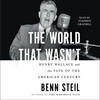Plus, receive recommendations and exclusive offers on all of your favorite books and authors from Simon & Schuster.
The World That Wasn't
Henry Wallace and the Fate of the American Century
By Benn Steil
Read by Stephen Graybill
LIST PRICE $34.99
PRICE MAY VARY BY RETAILER
Digital products purchased on SimonandSchuster.com must be read on the Simon & Schuster Books app. Learn more.
Free shipping when you spend $40. Terms apply.
Buy from Other Retailers
Table of Contents
Listen To An Excerpt
0:00 /
About The Book
From the acclaimed economist-historian and author of The Marshall Plan, a “timely, riveting” (The Washington Post) new perspective on the political career of Henry Wallace—one that will forever change how we view the making of US and Soviet foreign policy at the dawn of the Cold War.
Henry Wallace is the most important, and certainly the most fascinating, almost-president in American history. As FDR’s third-term vice president, and a hero to many progressives, he lost his place on the 1944 Democratic ticket in a wild open convention, resulting in Harry Truman becoming president upon FDR’s death. Books, films, and even plays have since portrayed the circumstances surrounding Wallace’s defeat as corrupt, and the results catastrophic. Filmmaker Oliver Stone, among others, has claimed that Wallace’s loss ushered in four decades of devastating and unnecessary Cold War.
Now, based on striking new finds from Russian, FBI, and other archives, Benn Steil’s The World That Wasn’t paints a decidedly less heroic portrait of the man, of the events surrounding his fall, and of the world that might have been under his presidency. Though a brilliant geneticist, Henry Wallace was a self-obsessed political figure, blind to the manipulations of aides—many of whom were Soviet agents and assets.
From 1933 to 1949, Wallace undertook a series of remarkable interventions abroad, each aimed at remaking the world order according to his evolving spiritual blueprint. As agriculture secretary, he fell under the spell of Russian mystics, and used the cover of a plant-gathering mission to aid their doomed effort to forge a new theocratic state in Central Asia. As vice president, he toured a Potemkin Siberian continent, guided by undercover Soviet security and intelligence officials who hid labor camps and concealed prisoners. He then wrote a book, together with an American NKGB journalist source, hailing the region’s renaissance under Bolshevik leadership. In China, the Soviets uncovered his private efforts to coax concessions to Moscow from Chiang Kai-shek, fueling their ambitions to dominate Manchuria. Running for president in 1948, he colluded with Stalin to undermine his government’s foreign policy, allowing the dictator to edit his most important election speech. It was not until 1950 that he began to acknowledge his misapprehensions regarding the Kremlin’s aims and conduct.
Meticulously researched and deftly written, The World That Wasn’t is a spellbinding work that shows how “American history—and world history—could have turned out very differently if just a few things had gone the other way” (The Wall Street Journal).
Henry Wallace is the most important, and certainly the most fascinating, almost-president in American history. As FDR’s third-term vice president, and a hero to many progressives, he lost his place on the 1944 Democratic ticket in a wild open convention, resulting in Harry Truman becoming president upon FDR’s death. Books, films, and even plays have since portrayed the circumstances surrounding Wallace’s defeat as corrupt, and the results catastrophic. Filmmaker Oliver Stone, among others, has claimed that Wallace’s loss ushered in four decades of devastating and unnecessary Cold War.
Now, based on striking new finds from Russian, FBI, and other archives, Benn Steil’s The World That Wasn’t paints a decidedly less heroic portrait of the man, of the events surrounding his fall, and of the world that might have been under his presidency. Though a brilliant geneticist, Henry Wallace was a self-obsessed political figure, blind to the manipulations of aides—many of whom were Soviet agents and assets.
From 1933 to 1949, Wallace undertook a series of remarkable interventions abroad, each aimed at remaking the world order according to his evolving spiritual blueprint. As agriculture secretary, he fell under the spell of Russian mystics, and used the cover of a plant-gathering mission to aid their doomed effort to forge a new theocratic state in Central Asia. As vice president, he toured a Potemkin Siberian continent, guided by undercover Soviet security and intelligence officials who hid labor camps and concealed prisoners. He then wrote a book, together with an American NKGB journalist source, hailing the region’s renaissance under Bolshevik leadership. In China, the Soviets uncovered his private efforts to coax concessions to Moscow from Chiang Kai-shek, fueling their ambitions to dominate Manchuria. Running for president in 1948, he colluded with Stalin to undermine his government’s foreign policy, allowing the dictator to edit his most important election speech. It was not until 1950 that he began to acknowledge his misapprehensions regarding the Kremlin’s aims and conduct.
Meticulously researched and deftly written, The World That Wasn’t is a spellbinding work that shows how “American history—and world history—could have turned out very differently if just a few things had gone the other way” (The Wall Street Journal).
About The Reader
Product Details
- Publisher: Simon & Schuster Audio (January 9, 2024)
- Runtime: 23 hours and 20 minutes
- ISBN13: 9781797172200
Browse Related Books
Resources and Downloads
High Resolution Images
- Book Cover Image (jpg): The World That Wasn't Unabridged Audio Download 9781797172200
- Author Photo (jpg): Benn Steil Photograph by Don Pollard(0.1 MB)
Any use of an author photo must include its respective photo credit


























